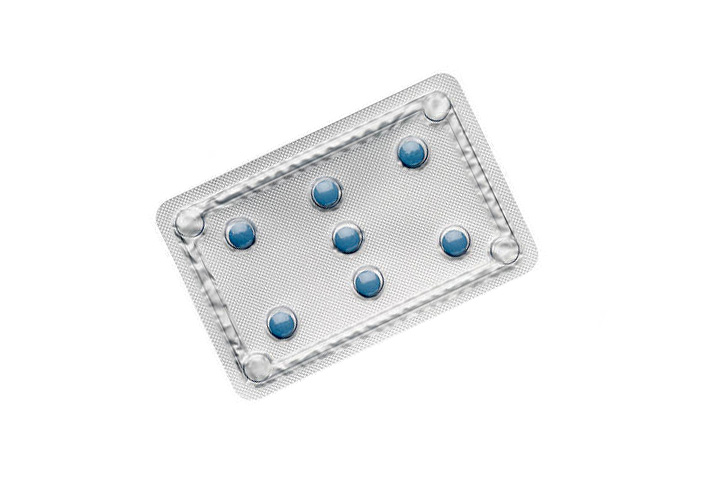Flagyl
Flagyl contains an active substance that acts on infections caused by both bacteria and single-cell organisms. The infectious agents that Flagyl combats live in poor or oxygen-free environments, and their preferred targets are the genitals or the gastrointestinal system.
Your doctor will prescribe Flagyl film-coated tablets in the presence of one of the following conditions: genital infection with Gardnerella (non-specific vaginitis) or Trichomonas; infection of the digestive system with Lamblia; infection of the digestive system or liver with amoebae; infection caused by bacteria living in a poor or oxygen-free environment (anaerobic bacteria).
Flagyl Vaginal Ovules is prescribed by your doctor for the treatment of your Trichomonas infection as a supplement to the film-coated tablets.
What Does Flagyl Contain?

Active ingredients
The active substance in Flagyl is metronidazole.
Excipients
Film-coated tablets: metronidazole 250 mg or 500 mg; wheat starch, povidone, magnesium stearate, hypromellose, macrogol 20 000.
Vaginal ova: metronidazole 500 mg, solid hemi-synthetic glycerides.
Forms and Strengths
250 mg film-coated tablets: 20.
Film-coated tablets 500 mg: 4 and 20.
Vaginal ova 500 mg: 10.
Uses
Your doctor will determine the dose and duration of treatment according to the infectious germ involved.
Dosage for film-coated tablets:
Infection with Gardnerella vaginalis: Two different treatment regimens are possible: either one 500 mg film-coated tablet 2 - 3 times a day for 5 - 7 days or an initial dose of 4 500 mg film-coated tablets taken simultaneously on the first day, followed by a second dose of 4 500 mg film-coated tablets on the 3rd day of treatment. The same treatment is recommended for the partner.
Trichomonas infection: Two different treatment regimens are possible: Single-dose treatment: 4 film-coated 500 mg tablets taken simultaneously, preferably at bedtime, or 10-day course: one film-coated 250 mg tablet morning and evening for 10 days. The same oral dose (in film-coated tablets) is recommended for the partner.
Lamblia infection: Cure for 5 consecutive days. Adults: 3 x 1 film-coated 250 mg tablet per day. Children: 15 mg of metronidazole per kg of body weight per day, divided into 3 doses. The tablets can be used in children if they are able to swallow a tablet and have a body weight of at least 50kg. If necessary, the doctor may order a second course of treatment after an interruption of 8 days.
Amoebiasis: Adults: one 500 mg film-coated tablet 3 - 4 times a day. Children: 40 mg per kg of body weight per day, divided into 3 - 4 doses: The tablets can be used in children if they are able to swallow a tablet and have a body weight of at least 19 kg. Duration of treatment: 7 - 10 days in acute cases.
Infection with anaerobic bacteria: 1 film-coated tablet of 500 mg three times a day for at least 10 days.
Dosage for ova:
Trichomonas infections: In addition to the standard 10-day oral treatment, insert one 500 mg metronidazole ovule deep into the vagina each evening for 10 - 20 days.
Antibiotic treatment should be continued for as long as prescribed by the doctor. Symptoms often disappear before the infection itself is completely cured. If the treatment is not continued for long enough, or if it is stopped prematurely, the infection may reappear.
Side Effects
Taking or using Flagyl may cause the following side effects:
Mild gastrointestinal disorders with nausea, vomiting, diarrhoea, abdominal pain, taste disorders, lack of appetite and anorexia are common.
Inflammation of the oral mucosa is rare.
Please consult your doctor or pharmacist immediately if you experience severe and persistent diarrhoea.
Hypersensitivity reactions such as pruritus, skin rash, urticaria, redness of the skin with a sensation of warmth and fever may occur, and very rarely serious allergic reactions with swelling of the face, tongue or larynx, palpitations, dyspnoea and a fall in blood pressure (to the point of shock and collapse). You should inform your doctor immediately if you experience such hypersensitivity reactions.
Headaches, dizziness and pruritus are common.
Rarely, depressed mood, depression, insomnia, weakness, sensory disturbances such as a feeling of deafness or, very rarely, loss of hearing and ringing or tingling, and disturbances in the coordination of movement and speech. Irrational thoughts, hallucinations, thoughts of self-harm or suicide have been observed with unknown frequency (mental health problems). Please consult your doctor immediately if you experience depressed mood or mental health problems. Transient visual disturbances (e.g. diplopia, myopia), hallucinations and diffuse cramps may occur very rarely. Dizziness (sensation of spinning) may occur. Tell your doctor immediately if you experience any of these side effects.
Very rarely, abnormal liver function values have been measured. Very rarely, pancreatitis or cholestatic hepatitis has been observed. Please inform your doctor immediately if you experience colic, nausea, vomiting or jaundice (yellowing of the skin and eyes).
Cases of severe and potentially life-threatening skin reactions have been reported. If you develop a blistering or peeling rash that may spread over the whole body or blisters on the skin, particularly around the lips, eyes, mouth, nose and genitals, potentially accompanied by fever, stop taking Flagyl and tell your doctor immediately.
Changes in cardiac activity (prolongation of the QT interval) visible on the electrocardiogram (ECG) have been reported, particularly when metronidazole is used with medicines that prolong the QT interval. If you experience palpitations, dizziness or syncope, you should inform your doctor immediately.
Discolouration of the tongue may occur in the case of fungal proliferation, a pasty tongue sensation and localised skin necrosis.
Rarely, cystitis, difficulty in micturition, urinary incontinence and mycosis in the genital region may occur.
The application of an ovule may cause a burning sensation and transient irritation of the vagina, which diminishes during treatment.
If you notice any side effects, please inform your doctor or pharmacist. This applies in particular to side effects not mentioned in this package leaflet.
Precautions
During and the day after treatment with Flagyl, it is recommended that you refrain from consuming alcoholic beverages or medicines containing alcohol, as the simultaneous intake of these two products leads to vomiting and abdominal cramps ("antabuse effect"). Do not take Flagyl at the same time as Antabus.
This medicine may affect reactions, driving ability and the ability to use tools or machines. In the event of signs of side-effects such as confusion, dizziness, hallucinations, cramps, transient visual problems or impaired coordination of movement, you must not drive a vehicle or operate machinery or tools.
If treatment with Flagyl is associated with an infection of the genital organs, sexual relations should be avoided for the duration of treatment.
If you experience any side effects, it is essential that you consult your doctor or pharmacist.
Regular medical supervision is necessary for any treatment lasting more than 10 days, in the event of high doses and in the event of haematological disorders.
Flagyl may potentiate the effect of various medicines, such as certain anticoagulants and ciclosporin.
Anti-epileptic drugs may reduce the efficacy of Flagyl (phenytoin, phenobarbital). Other drugs may increase the activity of Flagyl (including cimetidine, a drug used to treat gastric hyperacidity).
Undesirable effects have been observed in patients treated simultaneously with lithium and metronidazole. Lithium treatment should therefore be reduced or discontinued before metronidazole is administered. Any continuation of treatment must be strictly monitored by your doctor.
Some people treated with Flagyl may experience mental health problems, such as irrational thoughts, hallucinations, feeling confused or depressed, including thoughts of self-harm or suicide. These symptoms can occur even in people who have never had similar problems before. If you or others around you experience any of these side effects, consult a doctor immediately and discontinue treatment. In addition, if you suffer from alcoholism or Parkinson's disease, and in the event of repeated or prolonged use of Flagyl, your doctor will exercise caution due to the risk of psychosis.
Central and peripheral nervous system disorders may worsen during treatment with Flagyl. Inform your doctor and discontinue treatment if you experience dizziness (sensation of spinning, spinning top), altered consciousness and confusion, impaired judgement, sleep, paralysis or fever, if you experience involuntary muscle spasms, neck stiffness or pain, sensitivity to light, loss of co-ordination in walking and talking, tremors, sensitivity disorders (peripheral nerve damage) during treatment.
Please inform your doctor if you have severe liver disease or Cockayne's syndrome. Severe liver toxicity and acute liver failure, some of which have been fatal, have been reported in patients with Cockayne's syndrome who were treated with products containing metronidazole.
If you have Cockayne's syndrome, your doctor should monitor your liver function frequently during and after treatment with metronidazole.
Inform your doctor right away and discontinue using metronidazole if you experience any of the following symptoms: abdominal pain, loss of appetite, nausea, vomiting, fever, general discomfort, fatigue, jaundice, dark urine, pale stools, or itching.
Severe and potentially life-threatening skin reactions have been reported. If you develop a blistering or peeling rash that may spread over the whole body or blisters on the skin, particularly around the lips, eyes, mouth, nose and genitals, potentially accompanied by fever, stop your treatment with Flagyl and tell your doctor immediately.
In this case, treatment with metronidazole must never be used again.
Certain changes in cardiac activity visible on the electrocardiogram (ECG) have been reported, particularly when metronidazole is used with medicines liable to prolong the QT interval. You should therefore inform your doctor if you suffer from heart problems and/or if you are taking other medicines that may cause ECG changes (certain antiarrhythmic medicines - medicines for heart rhythm disorders - antibiotics or psychotropic drugs).
What else do you need to consider?
Genitourinary infections are transmissible diseases. Strict hygiene is therefore recommended to avoid re-infection. You should also find out whether your partner is undergoing treatment.
Do not use an Ortho-(R) diaphragm or contraceptive condoms at the same time as Flagyl ovules, as the surface of the diaphragm or condoms may be damaged and the action of the ovules may be impaired.
Remember that this medicine has been prescribed by your doctor for the treatment of your current condition. Flagyl does not work against all the micro-organisms that cause infections. Using the wrong medicine or the wrong dose can lead to complications. This medicine must not therefore be used to treat other illnesses or other people. In the event of a recurrence, it is important not to take the medicine without consulting your doctor again.
When should Flagyl not be used?
People who are allergic to the active substance in Flagyl or to chemically related substances should refrain from using this product (active substance = metronidazole; chemical family = imidazole derivatives).
Pregnancy and Breastfeeding
No systematic scientific study has been carried out. The safety of using Flagyl during pregnancy has not been sufficiently confirmed. Use during the first three months of pregnancy is contraindicated. Drug should not be used during the second and third trimesters of pregnancy, except on medical prescription.
Breast-feeding should be avoided while Flagyl is being used (until 24 hours after the last use of Flagyl).



